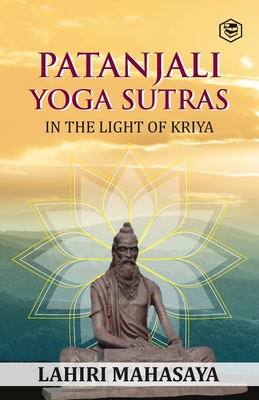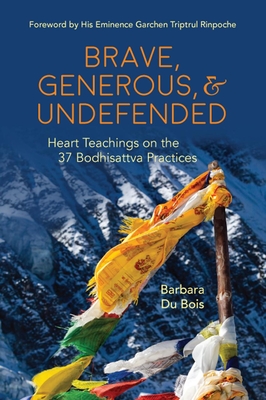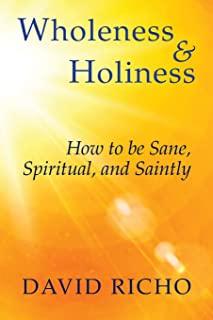
description
ahiri Mahasaya on Patanjali Yoga Sutras in the Light of Kriya.
All living beings are subject to the law of cause and effect. As a result of their past actions, they suffer again and again without breaking the cycle of births and deaths.
Desires cause them to embody and reembody in the world.
Once in embodiment, the individual seeks happiness and avoids pain and sorrow.
Pleasure and/or pain is reaped in this life according to past good and bad actions.
Moreover, in order to be happy in this world, one should also suffer because happiness and suffering are relative. There is no escape from suffering until all desires themselves are dissolved, or transcended.
Perfect Happiness can only be found in Peace, or Shanti.
How can one find Peace?
There is no other means for finding Peace except through the practice of Yoga. By the practice of Yoga, the tremendously restless heart becomes calm. Not only does the heart become calm by Yoga practice, but longevity is also increased. The body becomes healthy, and absolute Knowledge is gained.
Who can tell how long a man will remain alive?
It is well known that even ordinary people, without mentioning Yogis, can live up to one-hundred to one-hundred-fifty years. It is also admitted that, starting with the body in the mother's womb up to the age of eighty, individuals are faced with premature death.
What is the cause of premature death?
How can one prevent it?
Who is also lucky not to be afflicted with hereditary ill-health or premature death?
Individuals themselves are the cause of their own death. It will become clear when one analyzes the nature of his restless activities and desires in search of Happiness.
What could be more desirable than to enjoy Peace with a steadfast heart?
It In not so easy to remain steadfastly calm no matter what happens in life. But why in this not possible? Where is one's command over the mind?
One shall have to tactically acquire dominion over the mind. That can only be accomplished by Yoga practice.
It is possible to live even when all physical and mental activities have come to a stop when one practices Yoga.
Yoga is one of the six systems of philosophy. Yogi Patanjali is the founder of this system as well as the author of the many commentaries on Yogi Panini (the father of Sanskrit grammar).
This very valuable, tiny book is divided into four parts: In the first part, it describes the nature of Yoga, Samadhi, or "Attunement" with the ultimate Self and discusses its various aspects. In the second part, the first five steps of the eightfold Yoga path are outlined for the benefit of the truth seeker. In the third part, the last three steps are outlined, namely, Dharana ("concept of Tranquility"), Dhyana ("meditation") and Samadhi ("Attunement"). The state of going within during meditation practice and the danger of developing yogic powers on discussed. In fourth part, Kaivalya, or "the highest Liberation," is discussed. In fact, discussion of Yoga is the aim of this book.
All living beings are subject to the law of cause and effect. As a result of their past actions, they suffer again and again without breaking the cycle of births and deaths.
Desires cause them to embody and reembody in the world.
Once in embodiment, the individual seeks happiness and avoids pain and sorrow.
Pleasure and/or pain is reaped in this life according to past good and bad actions.
Moreover, in order to be happy in this world, one should also suffer because happiness and suffering are relative. There is no escape from suffering until all desires themselves are dissolved, or transcended.
Perfect Happiness can only be found in Peace, or Shanti.
How can one find Peace?
There is no other means for finding Peace except through the practice of Yoga. By the practice of Yoga, the tremendously restless heart becomes calm. Not only does the heart become calm by Yoga practice, but longevity is also increased. The body becomes healthy, and absolute Knowledge is gained.
Who can tell how long a man will remain alive?
It is well known that even ordinary people, without mentioning Yogis, can live up to one-hundred to one-hundred-fifty years. It is also admitted that, starting with the body in the mother's womb up to the age of eighty, individuals are faced with premature death.
What is the cause of premature death?
How can one prevent it?
Who is also lucky not to be afflicted with hereditary ill-health or premature death?
Individuals themselves are the cause of their own death. It will become clear when one analyzes the nature of his restless activities and desires in search of Happiness.
What could be more desirable than to enjoy Peace with a steadfast heart?
It In not so easy to remain steadfastly calm no matter what happens in life. But why in this not possible? Where is one's command over the mind?
One shall have to tactically acquire dominion over the mind. That can only be accomplished by Yoga practice.
It is possible to live even when all physical and mental activities have come to a stop when one practices Yoga.
Yoga is one of the six systems of philosophy. Yogi Patanjali is the founder of this system as well as the author of the many commentaries on Yogi Panini (the father of Sanskrit grammar).
This very valuable, tiny book is divided into four parts: In the first part, it describes the nature of Yoga, Samadhi, or "Attunement" with the ultimate Self and discusses its various aspects. In the second part, the first five steps of the eightfold Yoga path are outlined for the benefit of the truth seeker. In the third part, the last three steps are outlined, namely, Dharana ("concept of Tranquility"), Dhyana ("meditation") and Samadhi ("Attunement"). The state of going within during meditation practice and the danger of developing yogic powers on discussed. In fourth part, Kaivalya, or "the highest Liberation," is discussed. In fact, discussion of Yoga is the aim of this book.
member goods
No member items were found under this heading.
Return Policy
All sales are final
Shipping
No special shipping considerations available.
Shipping fees determined at checkout.







